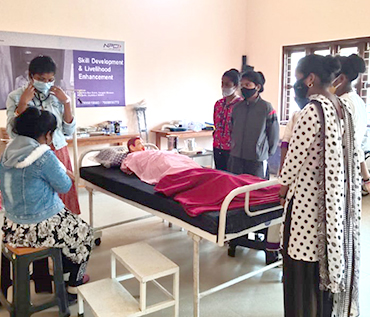
Bastar division is the one of the most poverty-hit area of Chhattisgarh, India. Looking at the situation BDKS conducted number of project activities for the betterment of the people. BDKS looking for a holistic, development of the people. So, most of the activities are result based. Some of the activities conducted in the Kolibeda block of Bastar division is given below.
Mrs. Manju is a member of Maa Durga Self Help Group in Hanparsi village. This village is situated inside a very dense forest area. The villagers have to travel 10km to buy their daily needs on the weekly market. In other days they have to travel 15 km to purchase household items. She has a plan to start a petty shop at her home but she didn’t have enough money for the same.
Suring this period her SHG received loan from project for IGP activity by the support of Mahindra group. Mrs. Manju took a loan of Rs. 5000 in the month of June 2018 to start a petty shop at her home. She also added some money through family support. In the beginning they use to sell Rs. 200 per day but gradually it increased and every day they sell Rs. 400-500. The family did not have knowledge on business but within 3 months they learnt it.
Now she is getting her daily needs from her own shop and she is able to save approximately Rs.100 daily. She is using the benefit by adding new items in her shop to make it larger.

Mrs. Manju is very happy now because her family’s economic status is increased. She also encourages other women to start a business to improve their family condition.The villagers are also happy because they are able to get all their needs in their village. They don’t need to travel long distance to purchase their daily need items. In this way the villagers could save their time and labor.
Manisha Tirky is 19-year-old gill lives in a small village named Khandi. She survives with six family members. Her father depends on the agriculture; they have small area of forest land. During non-agriculture season her parents work as daily labor to meet their family need. Her mother Mariam Tirky is a member of Unnati Self Help Group formed by the project in their village. She became a member of the SHG in the year 2016. She is regular and an active member of the SHG.
The project started a Skill Development center for the children of SHG members in the year 2020 at Chotte Bettiya village. The project hired a trainer to teach the girls in the Tailoring centre. Chhote Bethiya is three kilometers away from Khandi village. Manisha and her friends took admission in the center and started learning. Every day they go to the center by walk to attend the tailoring class. By the help of the instructor; she could learn the technique of cutting the cloth and stitching variety of dresses.
Manisha completes her three months tailoring course in the center and learn the tailoring skill. After completion of the course her mother took loan from the Self Help Group and gifted a new sewing machine to her. Manisha was very happy to have her own sewing machine at home. She took time and practiced what she learned from the center. Now she became a perfect tailor and able to stitch different types of dresses. She is the only tailor in her village and surrounding villages. She is getting work form the community and earning approximately INR 4000 per month. This is a great financial support to her family. She feels proud that she can support her family. Her family members are very happy that their family condition is improving. Manisha and her family extend their gratitude towards the project for the skill centre. Manisha now promoting other girls to join the skill centre and learn tailoring.

Bechaghata small village with 25 families is one of the target villages of BCDP under Bethiya Cluster. Though it is just 1 km away from the main road; it is not approachable during rainy season because of a river. One of the major problems of this village is safe drinking water. The villagers use to drink water from well or river. The intake of contaminated water causes various critical water borne diseases. Most of the people fall sick of jaundice and spend lots of money sometimes lives.
The villagers requested to the gram panchayat and other govt. officials for providing tube well or other source for safe drinking water but they didn’t get any positive response. The BCDP formed one Self Help Group in this village with 15 women members and they named it St. Alfunsa SHG.
The SHG women started meeting weekly and attending the training programs conducted by the project. During the SHG Training on Govt. Welfare Scheme the Resource Person Mr. D.K.Bhaskar taught the SHG women about the schemes on safe drinking water supply through high raised water tank with motor pump. He also taught about the process of tapping the schemes.

The women of St Alfunsa SHG started the process of application and put the agenda in Gram sabha to provide them water supply system for safe drinking water. The proposal was sanctioned and the water supply system with high raised water tank with motor pump was constructed in Bechaghat village.
Now the villagers of 163 populations are very happy to get safe drinking water all the time. The villagers appreciated SHG women for the kind of initiative for their village development.